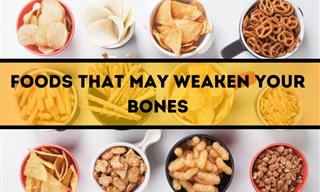When it comes to nutrition, people often unnecessarily deprive themselves of foods and drinks they love because they’re "unhealthy." For 99 percent of the foods we eat, that’s simply not true. In fact, limiting intake can lead to a binge-and-deprive cycle that can have dire consequences for one's health and well-being.
That said, there are a handful of foods that gastroenterologists — doctors who specialize in treating and teaching us to prevent gastrointestinal diseases — say they prefer to avoid or minimize as much as they can. These are those 8 types of foods. While eating them here and there is completely fine, they are not considered part of a GI-healthy weekly food plan.
Protein bars
Wait, aren’t protein bars supposed to be healthy? Compared to a chocolate bar, they may be, but most protein bars you can purchase at supermarkets also contain too much sugar, additives, and processed ingredients that lead to bloating. The problem with these snacks is that they’re essentially candy bars posing as health foods.
In reality, they contain no more protein than many less trendy and glamorous foods. “You can get the same amount of protein in a cup of milk, a serving of peanut butter, nuts or pumpkin seeds,” said Dr. Harmony Allison, a gastroenterologist.
White wine
While alcohol, in general, should be consumed carefully and in moderation, clear and non-tinted alcoholic beverages, such as champagne or white wine, are best avoided altogether. "I used to drink white wine, but now I drink red as my tastes have changed, and with the knowledge that it's healthier. As a generalization, darker foods—blueberries, red cherries, dark grapes—have a lot more healthy antioxidants than white foods," explained Dr. Edward Levine, associate professor of clinical medicine at The Ohio State Wexner Medical Center to Prevention.com.
Sorbitol and artificial sweeteners
“Sugar-free” is often considered a synonym for healthy food, or at least a healthier version of a not-so-healthy food (think sugar-free soda, chewing gum, cookies, etc.). However, that is rarely, if ever the case. Consider an ingredient called sorbitol, for example. It and artificial sweeteners take a very long time to digest, which can lead to digestive problems such as bloating, gas, and diarrhea.
Dr. Christina Tennyson, also a gastroenterologist, avoids artificial sweeteners and sorbitol as much as possible. “I’d rather have a teaspoon of sugar, which, you know, I don’t think is terrible,” she pointed out to Reader’s Digest.
Whipping cream and other foods high in saturated fats
Fats are somewhat tricky, as for decades, doctors, especially cardiologists, have demonized all fats. Now, we are all wiser and more advanced. We know that fats – especially omega-3s found in plants and fish – are actually healthy and even protective of certain health issues. Meanwhile, saturated fats should be consumed in small amounts, and trans fats should be avoided. The American College of Gastroenterology states: “To maintain good health, total fat intake should be reduced to 30% or less of calories. Saturated fat intake should only account for 10%.”
To give you a perspective of how much that is, 1 tablespoon of whipping cream contains around 18% of an adult’s daily value of saturated fats. Gastroenterologists recommend limiting your intake of fatty foods like butter and heavy cream. A high intake of these foods can accelerate gut contractions and lead to constipation or diarrhea.
Fried foods
Fried foods have got to be the worst kind of food for your digestive health. The high content of fats can contribute to heartburn, bloating, and other digestive issues. “Studies have shown that frying oil could adversely modulate the gut microbiome, leading to exacerbation of atherosclerosis (buildup of fat and other substances on the artery walls),” warned Dr. Mahmoud Ghannoum. So try to eat fried fish, fried chicken, French fries, and even fried veggies as little as possible, limiting it to celebrations or special occasions.
Red and processed meat
We’re sorry to write this point too, but gastroenterologists really don’t recommend eating steak and processed meats such as bacon, cold cuts, or hot dogs. “I avoid red meat, especially steaks and burgers,” stated Dr. Reezwana Chowdhury, to Huffington Post. Like dairy, these foods are high in saturated fats, but these types of meat – both red and processed – also increase the risk of colon polyps and colorectal cancer. The risk of colorectal cancer and the ingestion of red and processed meats four times weekly is increased by 20%.
Soda
We’ll keep this one brief, as it’s certainly no news that soda is not healthy, and it makes perfect sense that you rarely meet a gastro doctor who drinks soda – both regular and the diet kind. One repercussion to the gastrointestinal tract you may not be aware of is distress caused by the bubbles in carbonated beverages. This can lead to belching and acid reflux. Dr. Simon C. Matthews said the following about sugary drinks, “While they can be easy on the way down, these drinks are linked to chronic conditions as well, such as diabetes and heart disease.”
White bread
Dr. Shilpa Grover, a specialist in onco-gastroenterology, stated that white bread and other refined grains (such as white rice) increase one’s risk of diverticulosis, chronic diseases, and colorectal cancer. According to the Mayo Clinic, diverticulosis is a condition in which small, bulging pouches called diverticula grow in one’s intestines. If these pouches are infected, a condition called diverticulitis develops.
Diverticulitis also increases one’s risk of cancers in the GI tract. “Contrary to what was thought earlier, nuts, corn, and popcorn are not associated with an increase in the risk of developing diverticulosis, or complications like diverticulitis or bleeding,” Dr. Grover added.
In summary, it may be difficult to completely resist eating certain foods, even if they're not very healthy; and in the end, you don't have to. Just be more mindful of how often you consume them, and try to limit the amounts or replace them with healthier alternatives.
 Go to BabaMail
Go to BabaMail


























































